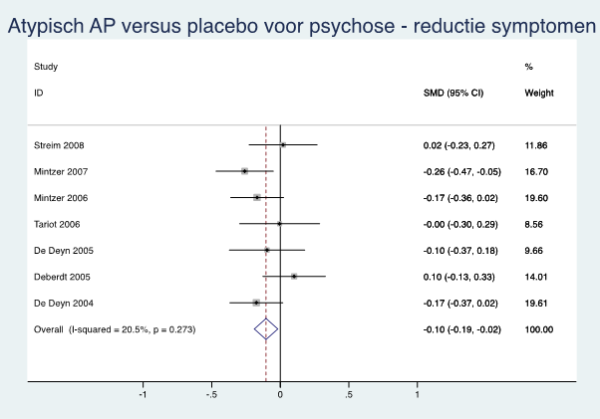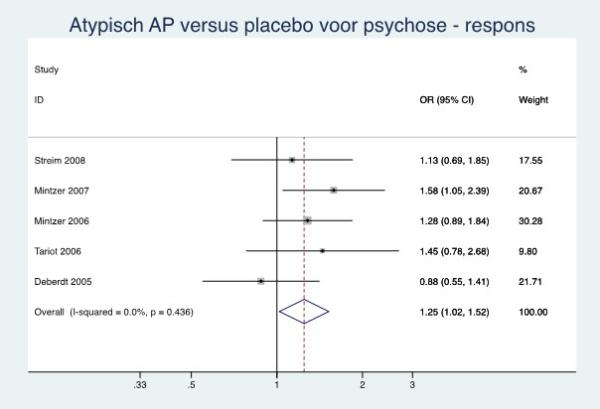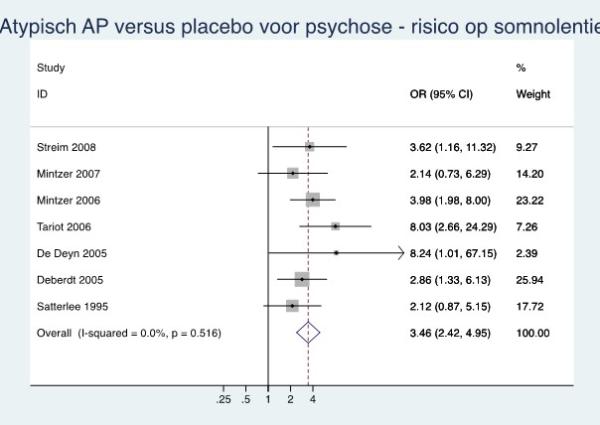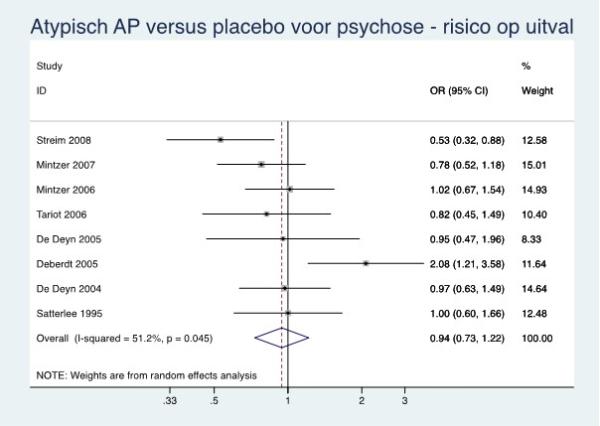|
Studie
|
Reden van exclusie
|
|
Allain, H., Dautzenberg, P., Maurer, K., Schuck, S., Bonhomme, D., & Gerard, D. (2000). Double blind study of tiapride versus haloperidol and placebo in agitation and aggressiveness in elderly patients with cognitive impairment. Psychopharmacology, (148), 361–366.
|
Trial, geen specifieke indicatie psychotisch gedrag.
|
|
Asayama, K., Yamadera, H., Ito, T., Suzuki, H., Kudo, Y., & Endo, S. (2003). Double blind study of melatonin effects on the sleep-wake rhythm, cognitive and non-cognitive functions in Alzheimer type dementia. J Nippon Med Sch, 70(4), 334–341.
|
Trial, geen specifieke indicatie psychotisch gedrag.
|
|
Auchus, A. P., & Bissey-Black, C. (1997). Pilot study of haloperidol, fluoxetine, and placebo for agitation in Alzheimer’s disease. J Neuropsychiatry Clin Neurosci, 9(4), 591–593.
|
Trial, geen specifieke indicatie psychotisch gedrag.
|
|
Bachinskaya, N., Hoerr, R., & Ihl, R. (2011). Alleviating neuropsychiatric symptoms in dementia: the effects of Ginkgo biloba extract EGb 761. Findings from a randomized controlled trial. Neuropsychiatr Dis Treat, 7, 209–215.
|
Trial, geen specifieke indicatie psychotisch gedrag.
|
|
Ballard, C., Margallo-Lana, M., Juszczak, E., Douglas, S., Swann, A., Thomas, A., … Jacoby, R. (2005). Quetiapine and rivastigmine and cognitive decline in Alzheimer’s disease: randomised double blind placebo controlled trial. BMJ (Clinical Research Ed.), 330(7496), 874.
|
Trial, geen specifieke indicatie psychotisch gedrag.
|
|
Ballard, C., Thomas, A., Gerry, S., Yu, L. M., Aarsland, D., Merritt, C., … Walker, Z. (2015). A double-blind randomized placebo-controlled withdrawal trial comparing memantine and antipsychotics for the long-term treatment of function and neuropsychiatric symptoms in people with Alzheimer’s disease (MAIN-AD). J Am Med Dir Assoc, 16(4), 316–322.
|
Trial, niet placebo-gecontroleerd.
|
|
Barnes, R., Veith, R., Okimoto, J., Raskind, M., & Gumbrecht, G. (1982). Efficacy of Antipsychotic Medications in Behaviorally Disturbed Dementia Patients. Am J Psychiatry, 139(9), 1170–1174.
|
Trial, geen specifieke indicatie psychotisch gedrag.
|
|
Bergh, S., Selbaek, G., & Engedal, K. (2012). Discontinuation of antidepressants in people with dementia and neuropsychiatric symptoms (DESEP study): double blind, randomised, parallel group, placebo controlled trial. Bmj, 344, e1566.
|
Stoptrial.
|
|
Brodaty, H., Ames, D., Snowdon, J., Woodward, M., Kirwan, J., Ch, B., … Grossman, F. (2003). A Randomized Placebo-Controlled Trial of Risperidone for the Treatment of Aggression, Agitation, and Psychosis of Dementia. J Clin Psychiatry, (February).
|
Trial, geen specifieke indicatie psychotisch gedrag.
|
|
Brodaty, H., Ames, D., Snowdon, J., Woodward, M., Kirwan, J., Clarnette, R., … Greenspan, A. (2005). Risperidone for psychosis of Alzheimer’s disease and mixed dementia: results of a double-blind, placebo-controlled trial. Int J Geriatr Psychiatry, 20(12), 1153–7.
|
Trial, geen specifieke indicatie psychotisch gedrag.
|
|
Cohen-Mansfield, J. (2003). Nonpharmacological Interventions for Psychotic Symptoms in Dementia. Journal Of Geriatric Psychiatry and Neurology, 16 (4), 219-224.
|
Trial, geen specifieke indicatie psychotisch gedrag.
|
|
De Deyn, P., Rabheru, K., & Rasmussen, A. (1999). A randomized trial of risperidone, placebo, and haloperidol for behavioral symptoms of dementia. Neurology, (53), 945–956.
|
Trial, geen specifieke indicatie psychotisch gedrag.
|
|
Devanand, D., Sackeim, H. A., Marder, K., Michaels, K., Bell, K., Sullivan, M. A., … Mayeux, R. (1998). A Randomized, Placebo-Controlled Dose-Comparison Trial of Haloperidol for Psychosis and Disruptive Behaviors in Alzheimer’s Disease. American Journal Psychiatry, 155(November), 1512–1520.
|
Trial, geen specifieke indicatie psychotisch gedrag.
|
|
Erkinjuntti, T., Kurz, A., Gauthier, S., Bullock, R., Lilienfeld, S., & Damaraju, C. V. (2002). Efficacy of galantamine in probable vascular dementia and Alzheimer’s disease combined with cerebrovascular disease: a randomised trial. Lancet (London, England), 359(9314), 1283–1290.
|
Trial, geen specifieke indicatie
psychotisch gedrag.
|
|
Finkel, S., Lyons, J., Anderson, R., & Sherrell, K. (1995). A Randomized, Placebo-controlled Trial of Thiothixene in Agitated, Demented Nursing Home Patients. International Journal of Geriatric Psychiatry, 10(June 1994), 129–136.
|
Trial, geen specifieke indicatie psychotisch gedrag.
|
|
Finkel, S. I., Mintzer, J. E., Dysken, M., Krishnan, K. R., Burt, T., & McRae, T. (2004). A randomized, placebo-controlled study of the efficacy and safety of sertraline in the treatment of the behavioral manifestations of Alzheimer’s disease in outpatients treated with donepezil. Int J Geriatr Psychiatry, 19(1), 9–18.
|
Trial, geen specifieke indicatie psychotisch gedrag.
|
|
Gaber, S., Ronzoli, S., Bruno, A., & Biagi, A. (2001). Sertraline versus small doses of haloperidol in the treatment of agitated behavior in patients with dementia. Archives of Gerontology and Geriatrics. Supplement, 7, 159–162.
|
Trial, niet placebo-gecontroleerd.
|
|
Gauthier, S., Feldman, H., Hecker, J., Vellas, B., Emir, B., & Subbiah, P. (2002). Functional, cognitive and behavioral effects of donepezil in patients with moderate Alzheimer’s disease. Current Medical Research and Opinion, 18(6), 347–354.
|
Trial, geen specifieke indicatie psychotisch gedrag.
|
|
Gavrilova, S. I., Preuss, U. W., Wong, J. W. M., Hoerr, R., Kaschel, R., & Bachinskaya, N. (2014). Efficacy and safety of Ginkgo biloba extract EGb 761 in mild cognitive impairment with neuropsychiatric symptoms: a randomized, placebo-controlled, double-blind, multi-center trial. International Journal of Geriatric Psychiatry, 29(10), 1087–1095.
|
Trial, niet in een studiepopulatie van mensen met dementie.
|
|
geen auteurs 2011. Treatment of Parkinson’s disease. Psychological disorders: striking a balance in order to optimise antiparkinsonian treatment. (2011). Prescrire Int, 20(120), 242–245.
|
Meta-analyse in studiepopulatie van mensen met ziekte van Parkinson, zonder dementie.
|
|
Gehrman, P. R., Connor, D. J., Martin, J. L., Shochat, T., Corey-Bloom, J., & Ancoli-Israel, S. (2009). Melatonin fails to improve sleep or agitation in double-blind randomized placebo-controlled trial of institutionalized patients with Alzheimer disease. Am J Geriatr Psychiatry, 17(2), 166–169.
|
Trial, geen specifieke indicatie psychotisch gedrag.
|
|
Hamilton, L., & Bennett, J. (1962). The Use Of Trifluoperazine in Geriatric Patients With Chronic Brain Syndrome. J Am Geriatr Soc, Feb(10), 140–147.
|
Trial, middel niet meer verkrijgbaar in Nederland.
|
|
Herrmann, N., Lanctot, K. L., Rothenburg, L. S., & Eryavec, G. (2007). A placebo-controlled trial of valproate for agitation and aggression in Alzheimer’s disease. Dement Geriatr Cogn Disord, 23(2), 116–119.
|
Trial, geen specifieke indicatie psychotisch gedrag.
|
|
Herrschaft, H., Nacu, A., Likhachev, S., Sholomov, I., Hoerr, R., & Schlaefke, S. (2012). Ginkgo biloba extract EGb 761(R) in dementia with neuropsychiatric features: a randomised, placebo-controlled trial to confirm the efficacy and safety of a daily dose of 240 mg. J Psychiatr Res, 46(6), 716–723.
|
Trial, geen specifieke indicatie psychotisch gedrag.
|
|
Holmes, C., Wilkinson, D., Dean, C., Vethanayagam, S., Olivieri, S., Langley, A., … Damms, J. (2004). The efficacy of donepezil in the treatment of neuropsychiatric symptoms in Alzheimer disease. Neurology, 63(2), 214–219.
|
Stoptrial.
|
|
Holmes, C., Wilkinson, D., Dean, C., Clare, C., El-Okl, M., Hensford, C., & Moghul, S. (2007, April). Risperidone and rivastigmine and agitated behaviour in severe Alzheimer’s disease: a randomised double blind placebo controlled study. International Journal of Geriatric Psychiatry. England.
|
Trial, niet placebo-gecontroleerd.
|
|
Howard, R. J., Juszczak, E., Ballard, C. G., Bentham, P., Brown, R. G., Bullock, R., … Rodger, M. (2007). Donepezil for the treatment of agitation in Alzheimer’s disease. The New England Journal of Medicine, 357(14), 1382–1392.
|
Trial, geen specifieke indicatie psychotisch gedrag.
|
|
Ihl, R., Bachinskaya, N., Korczyn, A. D., Vakhapova, V., Tribanek, M., Hoerr, R., & Napryeyenko, O. (2011). Efficacy and safety of a once-daily formulation of Ginkgo biloba extract EGb 761 in dementia with neuropsychiatric features: a randomized controlled trial. Int J Geriatr Psychiatry, 26(11), 1186–1194.
Iverson, G. L., Hopp, G. A., DeWolfe, K., & Solomons, K. (2002). Measuring change in psychiatric symptoms using the Neuropsychiatric Inventory: Nursing Home version. International Journal of Geriatric Psychiatry, 17(5), 438–443.
|
Trial, geen specifieke indicatie psychotisch gedrag.
|
|
Iwasaki, K., Satoh-Nakagawa, T., Maruyama, M., Monma, Y., Nemoto, M., Tomita, N., … Sasaki, H. (2005). A randomized, observer-blind, controlled trial of the traditional Chinese medicine Yi-Gan San for improvement of behavioral and psychological symptoms and activities of daily living in dementia patients. The Journal of Clinical Psychiatry, 66(2), 248–252.
|
Trial, niet placebo-gecontroleerd.
|
|
Jansen, S. L., Forbes, D. A., Duncan, V., & Morgan, D. G. (2006). Melatonin for cognitive impairment. Cochrane Database Syst Rev, (1), Cd003802.
|
Meta-analyse van trials zonder specifieke indicatie psychotisch gedrag.
|
|
Jansen, S. L., Forbes, D., Duncan, V., Morgan, D. G., & Malouf, R. (2006). Melatonin for the treatment of dementia. Cochrane Database of Systematic Reviews, 3(4).
|
Meta-analyse van trials zonder specifieke indicatie psychotisch gedrag.
|
|
Johannsen, P., Salmon, E., Hampel, H., Xu, Y., Richardson, S., Qvitzau, S., & Schindler, R. (2006). Assessing therapeutic efficacy in a progressive disease: a study of donepezil in Alzheimer’s disease. CNS Drugs, 20(4), 311–325.
|
Stoptrial.
|
|
Katz, I., Jeste, D., Mintzer, J., Clyde, C., Napolitano, J., & Brecher, M. (1999). Comparison of Risperidone and Placebo for Psychosis and Behavioral Disturbances Associated With Dementia: A Randomized, Double-Blind Trial. J Clin Psychiatry, 60(February), 107–115.
|
Trial, geen specifieke indicatie psychotisch gedrag.
|
|
Kavanagh, S., Gaudig, M., Van Baelen, B., Adami, M., Delgado, A., Guzman, C., … Schauble, B. (2011). Galantamine and behavior in Alzheimer disease: analysis of four trials. Acta Neurol Scand, 124(5), 302–308.
|
Meta-analyse van trials zonder specifieke indicatie psychotisch gedrag.
|
|
Krishnan, S., Cairns, R., & Howard, R. (2009). Cannabinoids for the treatment of dementia. Cochrane Database Syst Rev, (2), Cd007204.
|
Review met daarin een studie zonder indicatie psychotisch gedrag.
|
|
Kurlan, R., Cummings, J., Raman, R., & Thal, L. (2007). Quetiapine for agitation or psychosis in patients with dementia and parkinsonism. Neurology, 68(17), 1356–63.
|
Trial, geen specifieke indicatie psychotisch gedrag.
|
|
Lebert, F., Stekke, W., Hasenbroekx, C., & Pasquier, F. (2004). Frontotemporal dementia: a randomised, controlled trial with trazodone. Dement Geriatr Cogn Disord, 17(4), 355–359.
|
Trial, geen specifieke indicatie psychotisch gedrag.
|
|
Lockhart, I. A. A., Orme, M. E. E., & Mitchell, S. A. A. (2011). The efficacy of licensed-indication use of donepezil and memantine monotherapies for treating behavioural and psychological symptoms of dementia in patients with Alzheimer’s disease: systematic review and meta-analysis. Dement Geriatr Cogn Dis Extra, 1(1), 212–227.
|
Meta-analyse van trials zonder specifieke indicatie psychotisch gedrag.
|
|
Macdonald, A., Briggs, K., Poppe, M., Higgins, A., Velayudhan, L., & Lovestone, S. (2008). A feasibility and tolerability study of lithium in Alzheimer’s disease. International Journal of Geriatric Psychiatry, 23(7), 704–711.
|
Trial, geen specifieke indicatie psychotisch gedrag.
|
|
Matsuda, Y., Kishi, T., Shibayama, H., & Iwata, N. (2013). Yokukansan in the treatment of behavioral and psychological symptoms of dementia: a systematic review and meta-analysis of randomized controlled trials. Human Psychopharmacology, 28(1), 80–86.
|
Meta-analyse van niet-placebo gecontroleerde trials.
|
|
McKeith I, Del Ser T, Spano P, Emre M, Wesnes K, Anand R, Cicin-Sain A, Ferrara R, Spiegel R. Efficacy of rivastigmine in dementia with Lewy bodies: a randomised, double-blind, placebo-controlled international study. Lancet. 2000 Dec 16;356(9247):2031-6.
|
Trial, geen specifieke indicatie psychotisch gedrag.
|
|
Meehan, K. M., Wang, H., David, S. R., Nisivoccia, J. R., Jones, B., Beasley Jr., C. M., … Breier, A. (2002). Comparison of rapidly acting intramuscular olanzapine, lorazepam, and placebo: a double-blind, randomized study in acutely agitated patients with dementia. Neuropsychopharmacology, 26(4), 494–504.
|
Trial, geen specifieke indicatie psychotisch gedrag.
|
|
Mizukami, K., Asada, T., Kinoshita, T., Tanaka, K., Sonohara, K., Nakai, R., … Toba, K. (2009). A randomized cross-over study of a traditional Japanese medicine (kampo), yokukansan, in the treatment of the behavioural and psychological symptoms of dementia. The International Journal of Neuropsychopharmacology / Official Scientific Journal of the Collegium Internationale Neuropsychopharmacologicum (CINP), 12(2), 191–199.
|
Trial, niet placebo-gecontroleerd.
|
|
Monji, A., Takita, M., Samejima, T., Takaishi, T., Hashimoto, K., Matsunaga, H., … Kanba, S. (2009). Effect of yokukansan on the behavioral and psychological symptoms of dementia in elderly patients with Alzheimer’s disease. Progress in Neuro-Psychopharmacology & Biological Psychiatry, 33(2), 308–311.
|
Trial, niet placebo-gecontroleerd.
|
|
Mori, E., Ikeda, M., & Kosaka, K. (2012). Donepezil for dementia with Lewy bodies: a randomized, placebo-controlled trial. Ann Neurol, 72(1), 41–52.
|
Trial, geen specifieke indicatie psychotisch gedrag.
|
|
Napryeyenko, O., & Borzenko, I. (2007). Ginkgo biloba special extract in dementia with neuropsychiatric features. A randomised, placebo-controlled, double-blind clinical trial. Arzneimittel-Forschung, 57(1), 4–11.
|
Trial, geen specifieke indicatie psychotisch gedrag.
|
|
Nikolova G , Yancheva S , Raychev I, H. R. (2013). Ginkgo biloba extract in dementia: A 22-week randomised, placebo-controlled, double-blind trial . Bulgarian Neurology, 14, 139 – 143.
|
Trial, publicatie in Bulgaars.
|
|
Nyth, A. L., & Gottfries, C. G. (1990). The clinical efficacy of citalopram in treatment of emotional disturbances in dementia disorders. A Nordic multicentre study. Br J Psychiatry, 157, 894–901.
|
Trial, geen specifieke indicatie psychotisch gedrag.
|
|
Okahara, K., Ishida, Y., Hayashi, Y., Inoue, T., Tsuruta, K., Takeuchi, K., … Mitsuyama, Y. (2010). Effects of Yokukansan on behavioral and psychological symptoms of dementia in regular treatment for Alzheimer’s disease. Progress in Neuro-Psychopharmacology & Biological Psychiatry, 34(3), 532–536.
|
Trial, niet placebo-gecontroleerd.
|
|
Olafsson, K., Jorgensen, S., Jensen, H. V, Bille, A., Arup, P., & Andersen, J. (1992). Fluvoxamine in the treatment of demented elderly patients: a double-blind, placebo-controlled study. Acta Psychiatrica Scandinavica, 85(6), 453–456.
|
Trial, geen specifieke indicatie psychotisch gedrag.
|
|
Olin, J. T., Fox, L. S., Pawluczyk, S., Taggart, N. A., & Schneider, L. S. (2001). A pilot randomized trial of carbamazepine for behavioral symptoms in treatment-resistant outpatients with Alzheimer disease. Am J Geriatr Psychiatry, 9(4), 400–405. Retrieved from http://www.sciencedirect.com/science/article/pii/S1064748112614547
|
Trial, geen specifieke indicatie psychotisch gedrag.
|
|
Paleacu, D., Barak, Y., Mirecky, I., & Mazeh, D. (2008). Quetiapine treatment for behavioural and psychological symptoms of dementia in Alzheimer’s disease patients: a 6-week, double-blind, placebo-controlled study. Int J Geriatr Psychiatry, 23(September 2007), 393–400.
|
Trial, geen specifieke indicatie psychotisch gedrag.
|
|
Petrie, W., Ban, T., Berney, S., Fujimori, M., Guy, W., Ragheb, M., … Schaffer, D. (1982). Loxapine in Psychogeriatrics: A Placebo- and Standard-Controlled Clinical Investigation. Journal Clinical Psychopharmacology, 2(2), 122–126.
|
Trial, geen specifieke indicatie psychotisch gedrag.
|
|
Pollock, B., Mulsant, B., Rosen, J., Sweet, R., Mazumdar, S., Bharucha, A., … Chew, M. (2002). Comparison of Citalopram, Perphenazine, and Placebo for the Acute Treatment of Psychosis and Behavioral Disturbances in Hospitalized , Demented Patients. Am J Psychiatry, 159(March), 460–465.
|
Trial, geen specifieke indicatie psychotisch gedrag.
|
|
Pollock, B. G., Mulsant, B. H., Rosen, J., Mazumdar, S., Blakesley, R. E., Houck, P. R., & Huber, K. A. (2007). A double-blind comparison of citalopram and risperidone for the treatment of behavioral and psychotic symptoms associated with dementia. The American Journal of Geriatric Psychiatry : Official Journal of the American Association for Geriatric Psychiatry, 15(11), 942–952.
|
Trial, niet placebo-gecontroleerd.
|
|
Porsteinsson, A. P., Tariot, P. N., Erb, R., Cox, C., Smith, E., Jakimovich, L., … Irvine, C. (2001). Placebo-controlled study of divalproex sodium for agitation in dementia. Am J Geriatr Psychiatry, 9(1), 58–66. Retrieved from http://www.sciencedirect.com/science/article/pii/S106474811261848X
|
Trial, geen specifieke indicatie psychotisch gedrag.
|
|
Profenno, L. A., Jakimovich, L., Holt, C. J., Porsteinsson, A., & Tariot, P. N. (2005). A randomized, double-blind, placebo-controlled pilot trial of safety and tolerability of two doses of divalproex sodium in outpatients with probable Alzheimer’s disease. Curr Alzheimer Res, 2(5), 553–558.
|
Trial, geen specifieke indicatie psychotisch gedrag.
|
|
Rada, R., & Kellner, R. (1976). Thiothixene in the Treatment of Geriatric Patients With Chronic Organic Brain Syndrome. Journal of the American Geriatrics Society, 24(3), 105–107.
|
Trial, geen specifieke indicatie psychotisch gedrag.
|
|
Reisberg, B., Doody, R., Stoffler, A., Schmitt, F., Ferris, S., & Mobius, H. J. (2003). Memantine in moderate-to-severe Alzheimer’s disease. The New England Journal of Medicine, 348(14), 1333–1341.
|
Trial, geen specifieke indicatie psychotisch gedrag.
|
|
Riemersma-van der Lek, R. F., Swaab, D. F., Twisk, J., Hol, E. M., Hoogendijk, W. J., & Van Someren, E. J. (2008). Effect of Bright Light and Melatonin on Cognitive and Noncognitive Function in Elderly Residents of Group Care Facilities. Jama, 299(22), 2642.
|
Trial, geen specifieke indicatie psychotisch gedrag.
|
|
RIS-BEL-14. (1997). Unpublished.
|
Trial, geen specifieke indicatie psychotisch gedrag.
|
|
Rockwood, K., Mintzer, J., Truyen, L., Wessel, T., & Wilkinson, D. (2001). Effects of a flexible galantamine dose in Alzheimer’s disease: a randomised, controlled trial. Journal of Neurology, Neurosurgery, and Psychiatry, 71(5), 589–595.
|
Trial, geen specifieke indicatie psychotisch gedrag.
|
|
Schneider, L. S., Tariot, P. N., Lyketsos, C. G., Dagerman, K. S., Davis, K. L., Davis, S., … Lieberman, J. A. (2001). National Institute of Mental Health Clinical Antipsychotic Trials of Intervention Effectiveness (CATIE): Alzheimer disease trial methodology. The American Journal of Geriatric Psychiatry : Official Journal of the American Association for Geriatric Psychiatry, 9(4), 346–360.
|
Design van een trial, geen specifieke indicatie psychotisch gedrag.
|
|
Schneider, L. S., Ismail, M. S., Dagerman, K., Davis, S., Olin, J., McManus, D., … Tariot, P. N. (2003). Clinical Antipsychotic Trials of Intervention Effectiveness (CATIE): Alzheimer’s disease trial. Schizophrenia Bulletin, 29(1), 57–72.
Schneider, L. S., Tariot, P. N., Dagerman, K. S., Davis, S. M., Hsiao, J. K., Ismail, M. S., … Lieberman, J. A. (2006). Effectiveness of atypical antipsychotic drugs in patients with Alzheimer’s disease. N Engl J Med, 355(15), 1525–1538. (=CATIE)
|
Trial, geen specifieke indicatie psychotisch gedrag.
|
|
Seitz, D. P., Adunuri, N., Gill, S. S., Gruneir, A., Herrmann, N., & Rochon, P. (2011). Antidepressants for agitation and psychosis in dementia. Cochrane Database Syst Rev, (2), Cd008191.
|
Meta-analyse van antidepressiva, maar niet versus placebo of met indicatie psychotisch gedrag.
|
|
Seitz, D. P., Gill, S. S., Herrmann, N., Brisbin, S., Rapoport, M. J., Rines, J., … Conn, D. K. (2013). Pharmacological treatments for neuropsychiatric symptoms of dementia in long-term care: a systematic review. Int Psychogeriatr, 25(2), 185–203.
|
Review met daarin meta-analyses, maar niet van trials met specifieke indicatie psychotisch gedrag.
|
|
Serfaty, M., Kennell-Webb, S., Warner, J., Blizard, R., & Raven, P. (2002). Double blind randomised placebo controlled trial of low dose melatonin for sleep disorders in dementia. Int J Geriatr Psychiatry, 17(12), 1120–1127.
|
Trial, geen specifieke indicatie psychotisch gedrag.
|
|
Siddique, H., Hynan, L. S., & Weiner, M. F. (2009). Effect of a serotonin reuptake inhibitor on irritability, apathy, and psychotic symptoms in patients with Alzheimer’s disease. J Clin Psychiatry, 70(6), 915–918.
|
Trial, niet placebo-gecontroleerd.
|
|
Singer, C., Tractenberg, R. E., Kaye, J., Schafer, K., Gamst, A., Grundman, M., … Thal, L. J. (2003). A multicenter, placebo-controlled trial of melatonin for sleep disturbance in Alzheimer’s disease. Sleep, 26(7), 893–901.
|
Trial, geen specifieke indicatie psychotisch gedrag.
|
|
Sommer, O. H., Aga, O., Cvancarova, M., Olsen, I. C., Selbaek, G., & Engedal, K. (2009). Effect of oxcarbazepine in the treatment of agitation and aggression in severe dementia. Dement Geriatr Cogn Disord, 27(2), 155–163.
|
Trial, geen specifieke indicatie psychotisch gedrag.
|
|
Stinton, C., McKeith, I., Taylor, J. P., Lafortune, L., Mioshi, E., Mak, E., … O’Brien, J. T. (2015). Pharmacological Management of Lewy Body Dementia: A Systematic Review and Meta-Analysis. Am J Psychiatry, 172(8), 731–742.
|
Meta-analyse van trials die niet aan onze criteria voldoen.
|
|
Street, J. S., Clark, W. S., Gannon, K. S., Cummings, J. L., Bymaster, F. P., Tamura, R. N., … Breier, A. (2000). Olanzapine treatment of psychotic and behavioral symptoms in patients with Alzheimer disease in nursing care facilities: a double-blind, randomized, placebo-controlled trial. The HGEU Study Group. Arch Gen Psychiatry, 57(10), 968–976.
|
Trial, geen specifieke indicatie psychotisch gedrag.
|
|
Sugerman, A., Williams, B., & Alderstein, A. (1964). Haloperidol in the psychiatric disorders of old age. Clinical Notes, 1190–1192.
|
Trial, geen specifieke indicatie psychotisch gedrag.
|
|
Sultzer, D. L., Gray, K. F., Gunay, I., Berisford, M. A., & Mahler, M. E. (1997). A double-blind comparison of trazodone and haloperidol for treatment of agitation in patients with dementia. The American Journal of Geriatric Psychiatry : Official Journal of the American Association for Geriatric Psychiatry, 5(1), 60–69.
|
Trial, niet placebo-gecontroleerd.
|
|
Sultzer, D. L., Davis, S. M., Tariot, P. N., Dagerman, K. S., Lebowitz, B. D., Lyketsos, C. G., … Schneider, L. S. (2008). Clinical symptom responses to atypical antipsychotic medications in Alzheimer’s disease: phase 1 outcomes from the CATIE-AD effectiveness trial. Am J Psychiatry, 165(7), 844–854.
|
Trial, geen specifieke indicatie psychotisch gedrag.
|
|
Tampi, R., Aziz, R., Kantrowitz, J., Wilkins, K. M., Zdanys, K., & Muralee, S. (2009). Carbamazepine and oxcarbazepine for the treatment of behavioural and psychological symptoms of dementia (BPSD). Cochrane Database of Systematic Reviews.
|
Protocol van meta-analyse.
|
|
Tan, M. S., Yu, J. T., Tan, C. C., Wang, H. F., Meng, X. F., Wang, C., … Tan, L. (2015). Efficacy and adverse effects of ginkgo biloba for cognitive impairment and dementia: a systematic review and meta-analysis. J Alzheimers Dis, 43(2), 589–603.
|
Meta-analyse van trials zonder specifieke indicatie psychotisch gedrag.
|
|
Tariot, P. N., Erb, R., Podgorski, C. A., Cox, C., Patel, S., Jakimovich, L., & Irvine, C. (1998). Efficacy and tolerability of carbamazepine for agitation and aggression in dementia. Am J Psychiatry, 155(1), 54–61.
|
Trial, geen specifieke indicatie psychotisch gedrag.
|
|
Tariot, P. N., Cummings, J. L., Katz, I. R., Mintzer, J., Perdomo, C. A., Schwam, E. M., & Whalen, E. (2001). A randomized, double-blind, placebo-controlled study of the efficacy and safety of donepezil in patients with Alzheimer’s disease in the nursing home setting. Journal of the American Geriatrics Society, 49(12), 1590–1599.
|
Trial, geen specifieke indicatie psychotisch gedrag.
|
|
Tariot, P. N., Raman, R., Jakimovich, L., Schneider, L., Porsteinsson, A., Thomas, R., … Thal, L. (2005). Divalproex sodium in nursing home residents with possible or probable Alzheimer Disease complicated by agitation: a randomized, controlled trial. Am J Geriatr Psychiatry, 13(11), 942–949.
|
Trial, geen specifieke indicatie psychotisch gedrag.
|
|
Teri, L., Logsdon, R. G., Peskind, E., Raskind, M., Weiner, M. F., Tractenberg, R. E., … Thal, L. J. (2000). Treatment of agitation in AD: a randomized, placebo-controlled clinical trial. Neurology, 55(9), 1271–1278.
|
Trial, geen specifieke indicatie psychotisch gedrag.
|
|
van Dyck, C. H., Tariot, P. N., Meyers, B., & Malca Resnick, E. (2007). A 24-week randomized, controlled trial of memantine in patients with moderate-to-severe Alzheimer disease. Alzheimer Disease and Associated Disorders, 21(2), 136–143.
|
Trial, geen specifieke indicatie psychotisch gedrag.
|
|
von Gunten, A., Schlaefke, S., & Uberla, K. (2015). Efficacy of Ginkgo biloba extract EGb 761 in dementia with behavioural and psychological symptoms: A systematic review. The World Journal of Biological Psychiatry : The Official Journal of the World Federation of Societies of Biological Psychiatry, 1–12.
|
Meta-analyse van trials zonder specifieke indicatie psychotisch gedrag.
|
|
Wang, J., Yu, J. T., Wang, H. F., Meng, X. F., Wang, C., Tan, C. C., & Tan, L. (2015). Pharmacological treatment of neuropsychiatric symptoms in Alzheimer’s disease: a systematic review and meta-analysis. J Neurol Neurosurg Psychiatry, 86(1), 101–109.
|
Meta-analyse van trials zonder specifieke indicatie psychotisch gedrag.
|
|
Wild, R., Pettit, T., Burns, A., R., W., T., P., & A., B. (2003). Cholinesterase inhibitors for dementia with Lewy bodies. Cochrane Database Syst Rev, (3), Cd003672.
|
Review waarin één trial werd geïncludeerd, zonder specifieke indicatie psychotisch gedrag.
|
|
Winblad, B., Engedal, K., Soininen, H., Verhey, F., Waldemar, G., Wimo, A., … Subbiah, P. (2001). A 1-year, randomized, placebo-controlled study of donepezil in patients with mild to moderate AD. Neurology, 57(3), 489–495.
|
Trial, geen specifieke indicatie psychotisch gedrag.
|
|
Xiao, H., Su, Y., Cao, X., Sun, S., & Liang, Z. (2010). A meta-analysis of mood stabilizers for Alzheimer’s disease. J Huazhong Univ Sci Technolog Med Sci, 30(5), 652–658.
|
Meta-analyse van trials zonder specifieke indicatie psychotisch gedrag.
|
|
Zheng, L., Mack, W. J., Dagerman, K. S., Hsiao, J. K., Lebowitz, B. D., Lyketsos, C. G., … Schneider, L. S. (2009). Metabolic changes associated with second-generation antipsychotic use in Alzheimer’s disease patients: the CATIE-AD study. Am J Psychiatry, 166(5), 583–590.
|
Trial, geen specifieke indicatie psychotisch gedrag.
|
|
Zhong, K., Tariot, P., Mintzer, J., Minkwitz, M., & Devine, N. (2007). Quetiapine to Treat Agitation in Dementia : A Randomized , Double-Blind , Placebo-Controlled Study. Current Alzheimer Research, 4(1), 81–93.
|
Trial, geen specifieke indicatie psychotisch gedrag.
|





